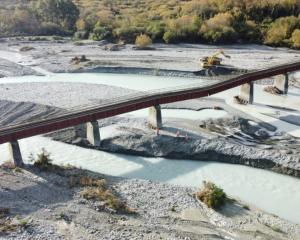
The group, chaired by former Labour Finance Minister Sir Michael Cullen, this morning recommended that the Government implement a capital gains tax (CGT).
The tax would cover assets such as land, shares, investment properties, businesses assets and intellectual property, but would exclude the family home, cars, boats and art.
It would raise more than $8 billion over five years and Cullen laid out a range of other taxation options as to what that could be spent on.
National leader Simon Bridges - who yesterday said he was expecting a "big, hairy capital gains tax" - said the working group's recommendations went further than just suggesting a CGT.
He said there were eight taxes recommended, including a tax on agriculture, water, the environment and waste.
"This is an attack on the Kiwi way of life," Bridges told reporters.
"This would hit every New Zealander with a KiwiSaver, shares, investment property, a small business, a lifestyle block, a bach or even an empty section."
However, some Kiwis don't agree with Bridge's statement, mainly pointing out that it will kill his 'Kiwi way of life' and not theirs.
"You mean *your* way of life. Most Kiwis don't own 4 properties and are directors or have controlling interests in property investment companies," Green MP Gareth Hughes commented on his Tweet.
A minority agreed with Bridges' statement, saying it will negatively affect those who build local businesses or own large sections.
ACT leader David Seymour was also critical of the tax proposal, saying the working group's recommendations were "offensive to New Zealand values".
"This tax will reduce savings and investment in productive assets - the very assets an economy needs to grow and prosper - by doubling them."
Cullen, along with Finance Minister Grant Robertson and Revenue Minister Stuart Nash, were at pains to point out that any changes to the tax system would be about creating fairness.
But Bridges said that was "rubbish".
In fact, he said, the CGT that Cullen recommended was one of the highest in the world.
"We believe New Zealanders already pay enough tax and the Government should be looking at tax relief, not taking even more out of the pockets of New Zealand families."
The working group's recommendations are now with the Government, which has begun the process of considering which to adopt into law. It will report back in April.
Between now and April, all parts of the Government - New Zealand First, as coalition partners with Labour, and the Greens providing confidence and supply - will be negotiating how to proceed.
The Greens are keen for a CGT, but NZ First have in the past come out against such a tax.
The Government does not have to adopt Cullen's recommendations to the letter, and has the scope to make some changes.
Speaking to media this afternoon, Prime Minister Jacinda Ardern said the Government would now take a bit of time to form a consensus around its response.
Asked about National's response to the report, she harked back to the 2010 tax working group report which suggested changes to the tax system.
"I do recall a time when that National Party undertook a similar bit of work and it came back with some very similar suggestions.
"They did what we are now doing, which is taking the time to consider the report."
Asked how Labour would get NZ First on board with a CGT, Ardern said in the same way that we progress with any matter in Government.
"We build consensus, and that's exactly the process we will adopt in this case."
Robertson said he had had some preliminary discussions with Peters which had been "very general" and described them as "constructive".
Key recommendations
• Capital gains tax to apply after the sale of residential property, businesses, shares, all land and buildings except the family home, and intangibles such as intellectual property and goodwill.
• Tax rate to be set at the income-earner's top tax rate, likely to be 33 per cent for most.
• Calculation of gains not to be retrospective - tax to be applied to gains made after April 2021.
• Art, boats, cars, bikes, jewellery, personal household items and the family home to be exempt.
• Losses on the sale of assets bought before April 2021 will generally be able to be used to reduce paid on gains from other assets.
• Increase the threshold of the lowest tax rate (10.5 per cent), allowing more income to be taxed at the lower rate.
• Increase social welfare net benefits to allow similar benefits as low-income earners post tax threshold adjustments.
• House on farms and surrounding land up to 4500 sq metres exempt from CGT, calculated as a percentage of total farm value.
• CGT on small businesses can be deferred (roll over relief) if annual turnover is less than $5 million and sale proceeds are reinvested in similar asset class.
• No support to make company tax progressive, i.e. smaller companies paying less than 28 per cent.
• Capital gains tax estimated to raise $8.3 billion over five years.
• Expand coverage and rate of Waste Disposal Levy, expand the ETS and use congestion charging.
• Better tax benefits for KiwiSavers on low and middle incomes.
Comments
An non taxed boom in property market speculation is what has attacked the 'The Kiwi way of life' more than anything this last 20 years Mr. Bridges. It was once quite possible for the average family to afford decent accommodation and 'rough sleeping' was something you did with friends on the beach in summer.
Per the proposals the family home will not be exempt if you are running a business from it or have a home office. This will create a capital tax implication for a lot of New Zealanders.












